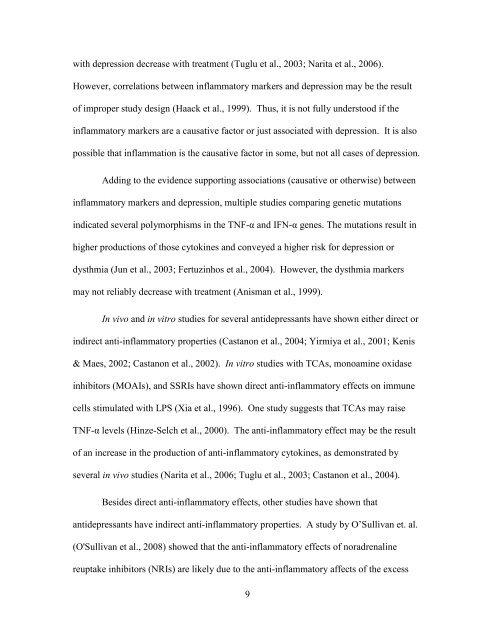INDUCTION OF DEPRESSION BY EXPOSURE TO DAMP ...
INDUCTION OF DEPRESSION BY EXPOSURE TO DAMP ...
INDUCTION OF DEPRESSION BY EXPOSURE TO DAMP ...
You also want an ePaper? Increase the reach of your titles
YUMPU automatically turns print PDFs into web optimized ePapers that Google loves.
with depression decrease with treatment (Tuglu et al., 2003; Narita et al., 2006).<br />
However, correlations between inflammatory markers and depression may be the result<br />
of improper study design (Haack et al., 1999). Thus, it is not fully understood if the<br />
inflammatory markers are a causative factor or just associated with depression. It is also<br />
possible that inflammation is the causative factor in some, but not all cases of depression.<br />
Adding to the evidence supporting associations (causative or otherwise) between<br />
inflammatory markers and depression, multiple studies comparing genetic mutations<br />
indicated several polymorphisms in the TNF-α and IFN-α genes. The mutations result in<br />
higher productions of those cytokines and conveyed a higher risk for depression or<br />
dysthmia (Jun et al., 2003; Fertuzinhos et al., 2004). However, the dysthmia markers<br />
may not reliably decrease with treatment (Anisman et al., 1999).<br />
In vivo and in vitro studies for several antidepressants have shown either direct or<br />
indirect anti-inflammatory properties (Castanon et al., 2004; Yirmiya et al., 2001; Kenis<br />
& Maes, 2002; Castanon et al., 2002). In vitro studies with TCAs, monoamine oxidase<br />
inhibitors (MOAIs), and SSRIs have shown direct anti-inflammatory effects on immune<br />
cells stimulated with LPS (Xia et al., 1996). One study suggests that TCAs may raise<br />
TNF-α levels (Hinze-Selch et al., 2000). The anti-inflammatory effect may be the result<br />
of an increase in the production of anti-inflammatory cytokines, as demonstrated by<br />
several in vivo studies (Narita et al., 2006; Tuglu et al., 2003; Castanon et al., 2004).<br />
Besides direct anti-inflammatory effects, other studies have shown that<br />
antidepressants have indirect anti-inflammatory properties. A study by O’Sullivan et. al.<br />
(O'Sullivan et al., 2008) showed that the anti-inflammatory effects of noradrenaline<br />
reuptake inhibitors (NRIs) are likely due to the anti-inflammatory affects of the excess<br />
9


